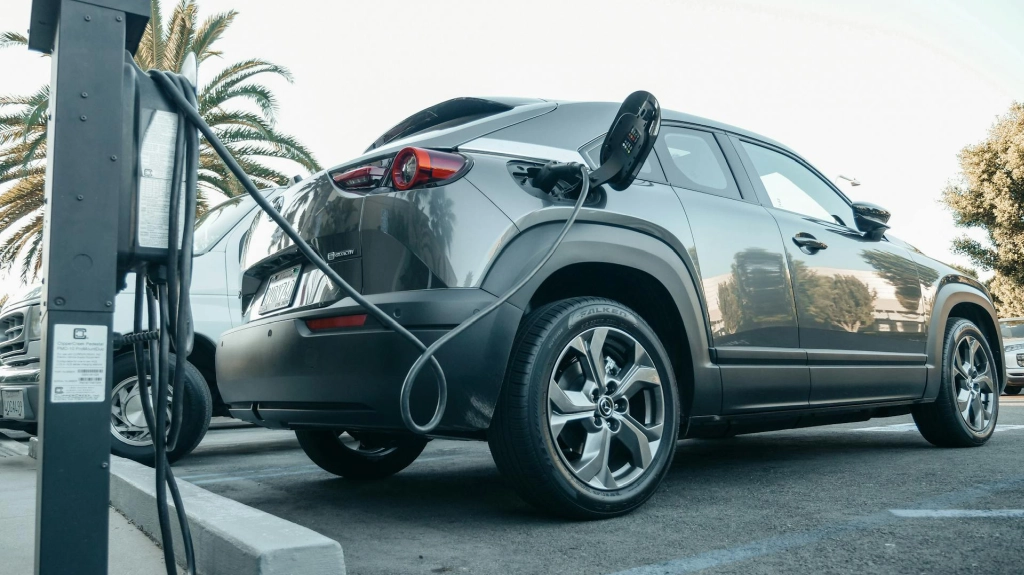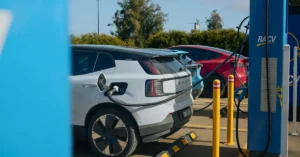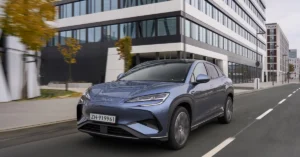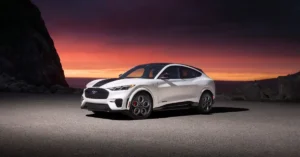Wondering how long an EV battery lasts in the UAE heat? Here’s the real story from battery basics to lifespan, degradation, and charging tips.
If you’re considering switching to an electric car in the UAE, chances are your biggest concern is the battery and for good reason. It’s the heart (and most expensive component) of any electric vehicle (EV). But how long does it really last? What affects its performance over time? And can UAE’s climate reduce its life?
Let’s break it all down so you can make a confident decision when buying or maintaining an electric car in the UAE.
First, What Kind of Batteries Do EVs Use?
Electric vehicles have two types of batteries:
- 12V Battery (Low-Voltage)
Just like in patrol cars, this small battery powers low-voltage systems things like headlights, wipers, power windows, and even the EV’s onboard computer. If this battery dies, your EV won’t start no matter how full your main battery is. - Traction Battery (High-Voltage)
This is the one that matters most for driving range. It powers the motor that moves the car and is recharged using an EV charger or through regenerative braking.
Most EVs today use Lithium-ion (Li-ion) batteries the same technology that powers your smartphone, just on a much bigger scale.
What Makes Li-ion Batteries Ideal for EVs?
- High energy density: More energy in a smaller space.
- High power-to-weight ratio: Important for performance and efficiency.
- Recharge flexibility: Can be charged from any state full, empty, or halfway.
EV batteries are built with thousands of small cells grouped into modules. If one cell fails, it won’t bring down the entire system unlike a petrol engine, where one part can cause a total breakdown.
Battery Size vs Driving Range
The energy capacity of an EV battery is measured in kWh (kilowatt-hours). Generally, the bigger the number, the longer the range. But it’s not that simple real-world range depends on:
- Driving speed (fast driving drains power faster)
- Terrain (hilly routes use more energy)
- Load (more passengers = more energy used)
- A/C and heater usage (especially in UAE summers)
- Regenerative braking (saves energy during braking)
Example: A 64-kWh battery might offer up to 400 km range but in peak Dubai summer with A/C blasting, expect closer to 320–350 km.
How Long Do EV Batteries Really Last?
Most EV makers offer 8-year or 160,000 km warranties (whichever comes first), promising at least 70–80% battery health (State of Health, or SoH). Some brands go even further:
- Tesla offers up to 240,000 km on its Model S/X.
- Hyundai has published real-world numbers showing EV batteries can last up to 22 years if charged smartly.
According to a global EV study by Geotab, EV batteries lose just 2.3% capacity per year on average. That means a 400 km EV will still offer around 350 km range after 5 years and that’s in mixed climate conditions.
Does the UAE’s Heat Affect EV Batteries?
Yes, and here’s how:
- High temperatures can speed up battery degradation.
- Extreme heat can reduce range (as energy is used to cool the battery and cabin).
- Battery cooling systems help, but not all EVs are created equal.
If your EV has a battery preconditioning feature, use it before charging or driving. It helps maintain optimal battery temperature and performance.
Charging Habits That Help Battery Life
The way you change your EV matters just as much as how often you drive. Here are smart charging habits for longer battery life:
Do:
- Keep charge levels between 20% and 80% daily
- Use AC charging (slower, but gentler on the battery)
- Precondition your battery before charging or driving (if available)
- Follow your manufacturer’s guidelines for optimal care
Avoid:
- Letting the battery drop to 0%
- Charging to 100% and leaving it plugged in for hours
- Relying too much on fast chargers (DC charging) they generate more heat
Battery Lifespan: How Smart Charging Makes a Big Difference
Let’s take the Hyundai Ioniq 5 (with a 77.4 kWh battery and an estimated range of around 507 km) as a real-world example:
- If you fully drain the battery to 0% and recharge daily → you’ll get around 1,000 full charge cycles, or roughly 507,000 km.
- If you use only 50% of the battery before recharging → that jumps to around 5,000 partial cycles, or 1.26 million km.
- If you just use 20% before recharging → the battery could handle up to 8,000 cycles, which adds up to an incredible 2 million+ km of driving.
So, if you’re driving between 60 to 100 km per day in the UAE say, from Sharjah to Dubai or around Abu Dhabi and you keep your charging habits smart (ideally between 20%–80%), your Ioniq 5 battery can easily outlast the car itself, and even most petrol engines.
Signs of Battery Degradation (And What to Do)
Even with great care, batteries slowly degrade. Watch out for:
- Reduced range on full charge
- Slower charging speeds
- More frequent need to recharge
If you’re experiencing these, it doesn’t always mean battery failure. A diagnostic check can identify whether it’s battery health, cooling system, or a software issue.
What About Battery Recycling or Replacement?
It’s still early days most EVs on UAE roads are less than 5–7 years old. Battery failures are rare. And when EV batteries do reach the end of life, they are often reused as backup storage in solar or grid applications.
EV battery recycling facilities are being developed globally, with UAE authorities actively supporting green mobility solutions, so expect more local options soon.
How Does an EV Battery Compare to a Petrol Engine?
After 300,000+ km, most petrol or diesel engines require major maintenance or rebuilds.
But EVs?
- Still run smoothly
- Require fewer moving parts to maintain
- And even with some range loss, are still reliable
Ready to Go Electric in the UAE?
Battery anxiety is real but it doesn’t need to be. Today’s EVs are smarter, stronger, and more heat-resistant than ever before. With proper care, your EV battery can outlast the car itself.
Need Help with EV Battery Checks or Charging Setup?
MotorHub connects you with trusted EV technicians and service centers across the UAE.
Whether it’s time for a diagnostic check, a battery health report, or mobile EV charging we’ve got you covered.



